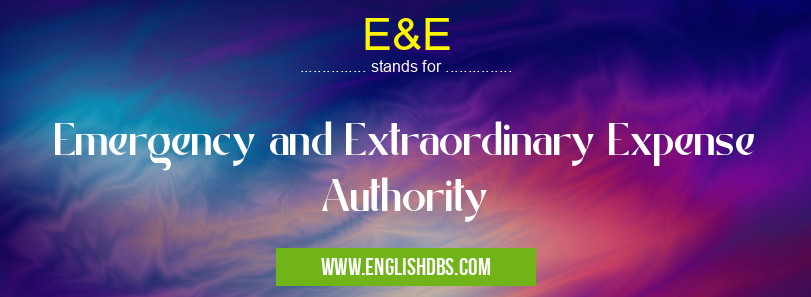What does E&E mean in MILITARY
Emergency and Extraordinary Expense Authority (E&E) is a specific type of authorization granted to an individual, organization or government institution. It gives them the power to access public funds or resources in order to respond rapidly and effectively to urgent situations or difficult-to-foresee circumstances. E&E's primary purpose is to allow those with authority to make decisions and take action in a short period of time when it would otherwise be impossible.

E&E meaning in Military in Governmental
E&E mostly used in an acronym Military in Category Governmental that means Emergency and Extraordinary Expense Authority
Shorthand: E&E,
Full Form: Emergency and Extraordinary Expense Authority
For more information of "Emergency and Extraordinary Expense Authority", see the section below.
» Governmental » Military
Definition
In general, Emergency and Extraordinary Expense Authority allows those with the appropriate authority to quickly access public funds or resources in order to cover expenses related to emergencies, unforeseen events, critical repairs or unanticipated purchases that are essential for continued operations. The authority must be clearly defined in terms of who has the right to approve any expenditures made under E&E and in what amount.
Uses
The use cases for Emergency and Extraordinary Expense Authority are diverse. In some cases, E&E can be used by organizations such as emergency management agencies that must handle urgent matters quickly and without delay. In other cases, it may be used by public institutions needing financial flexibility during difficult economic times. No matter the circumstances, having the authority and ability to meet emergent needs is invaluable for those with E&E oversight.
Advantages
The main advantage of having Emergency and Extraordinary Expense Authority lies in its speed of action compared with traditional methods of accessing funds - often allowing decisions to be made faster than if they had been approved through standard processes. With access granted securely and swiftly, those with E&E can respond rapidly when normal procedures would prevent them from doing so. In addition, having this functionality also provides greater assurance that funds are utilized properly since more detailed reporting is often required when using E&E than regular funding sources due its special nature.
Disadvantages
Emergency and Extraordinary Expenses incurred through this kind of authority must still adhere to all applicable regulations regarding public spending - including proper approval process while also meeting all record keeping requirements before use can occur. In addition, organizations need strong internal controls in place surrounding approval limits for E&Es as well as following up on documentation related to their usage for proper auditability purposes. Those safeguards can add additional bureaucratic steps that could delay decision making if not managed carefully.
Essential Questions and Answers on Emergency and Extraordinary Expense Authority in "GOVERNMENTAL»MILITARY"
What is the Emergency and Extraordinary Expense Authority?
The Emergency and Extraordinary Expense Authority allows for expenses beyond normal operational expenditures when responding to an emergency situation. These funds may be used to cover the costs of materials, personnel, equipment, and other related costs that are a result of an emergency event.
Who can approve requests under the Emergency and Extraordinary Expense Authority?
Requests under the Emergency and Extraordinary Expense Authority must be approved by the responsible organizational head or authorized designee as outlined in applicable agency policies.
What kinds of expenses are covered under the Emergency and Extraordinary Expense Authority?
The Emergency and Extraordinary Expense Authority covers any costs associated with responding to an emergency situation, such as materials, personnel, equipment, and other related costs.
When can usage of the Emergency and Extraordinary Expense Authority be approved?
Usage of the Emergency and Extraordinary Expense Authority can be approved when circumstances require immediate action in order to reduce or eliminate significant damage or personal harm that cannot otherwise be adequately addressed.
How long does it take for approval of requests under the Emergency and Extraordinary Expense Authority?
Requests for approval under theEmergency and Extraordinary Expense Authority should be submitted as soon as possible. Depending on factors such as urgency of response needed or documentation required, approval times will vary.
Is there a limit on how much funding can be requested using this authority?
Yes, all requests must remain within established funding limits which vary depending on specific agency policies.
Are there restrictions as to how funds obtained through this authority can be used?
Yes, expenditures must comply with all applicable laws including procurement regulations and other governing agency directives. Funds should only be used for purposes directly related to addressing an emergency situation.
Can I use these funds for personnel expenses?
Yes, personnel expenses associated with responding to an emergency situation can be covered under the Emergency and Extraordinary Expense Authority if they are necessary in reducing or eliminating significant damage or personal harm that cannot otherwise be adequately addressed.
How do I go about obtaining approval for requests under this authority?
Requests for approval must include full documentation such as justifications describing why expenditure is necessary due to an emergency situation; estimated cost; source from which funding will come; delivery schedule; method of payment; purpose/justification statement etc., depending on specifics requirements outlined in applicable agency policy. Submit request to responsible organizational head or authorized designee for final approval according to policy procedures.
Final Words:
In summary, Emergency and Extraordinary Expense Authority represents an effective mechanism for dealing rapidly with unpredictable situations requiring immediate attention or special resources not readily available through traditional sources of funding. Although there are certain administrative requirements associated with its use, those safeguards help ensure that any expenses made will adhere properly made according the applicable laws governing its usage - resulting in greater fiscal responsibility over time.
